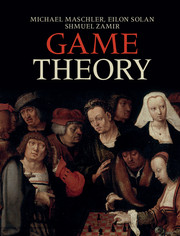Book contents
- Frontmatter
- Contents
- Acknowledgments
- Notations
- Introduction
- 1 The game of chess
- 2 Utility theory
- 3 Extensive-form games
- 4 Strategic-form games
- 5 Mixed strategies
- 6 Behavior strategies and Kuhn's Theorem
- 7 Equilibrium refinements
- 8 Correlated equilibria
- 9 Games with incomplete information and common priors
- 10 Games with incomplete information: the general model
- 11 The universal belief space
- 12 Auctions
- 13 Repeated games
- 14 Repeated games with vector payoffs
- 15 Bargaining games
- 16 Coalitional games with transferable utility
- 17 The core
- 18 The Shapley value
- 19 The bargaining set
- 20 The nucleolus
- 21 Social choice
- 22 Stable matching
- 23 Appendices
- References
- Index
13 - Repeated games
- Frontmatter
- Contents
- Acknowledgments
- Notations
- Introduction
- 1 The game of chess
- 2 Utility theory
- 3 Extensive-form games
- 4 Strategic-form games
- 5 Mixed strategies
- 6 Behavior strategies and Kuhn's Theorem
- 7 Equilibrium refinements
- 8 Correlated equilibria
- 9 Games with incomplete information and common priors
- 10 Games with incomplete information: the general model
- 11 The universal belief space
- 12 Auctions
- 13 Repeated games
- 14 Repeated games with vector payoffs
- 15 Bargaining games
- 16 Coalitional games with transferable utility
- 17 The core
- 18 The Shapley value
- 19 The bargaining set
- 20 The nucleolus
- 21 Social choice
- 22 Stable matching
- 23 Appendices
- References
- Index
Summary
Chapter summary
In this chapter we present the model of repeated games. A repeated game consists of a base game, which is a game in strategic form, that is repeated either finitely or infinitely many times. We present three variants of this model:
The finitely repeated game, in which each player attempts to maximize his average payoff.
The infinitely repeated game, in which each player attempts to maximize his long-run average payoff.
The infinitely repeated game, in which each player attempts to maximize his discounted payoff.
For each of these models we prove a Folk Theorem, which states that under some technical conditions the set of equilibrium payoffs is (or approximates) the set of feasible and individually rational payoffs of the base game.
We then extend the Folk Theorems to uniform equilibria for discounted infinitely repeated games and to uniform ε-equilibria for finitely repeated games. The former is a strategy vector that is an equilibrium in the discounted game, for every discount factor sufficiently close to 1, and the latter is a strategy vector that is an ε-equilibrium in all sufficiently long finite games.
In the previous chapters, we dealt with one-stage games, which model situations where the interaction between the players takes place only once, and once completed, it has no effect on future interactions between the players. In many cases, interaction between players does not end after only one encounter; players often meet each other many times, either playing the same game over and over again, or playing different games.
- Type
- Chapter
- Information
- Game Theory , pp. 519 - 568Publisher: Cambridge University PressPrint publication year: 2013
- 3
- Cited by



